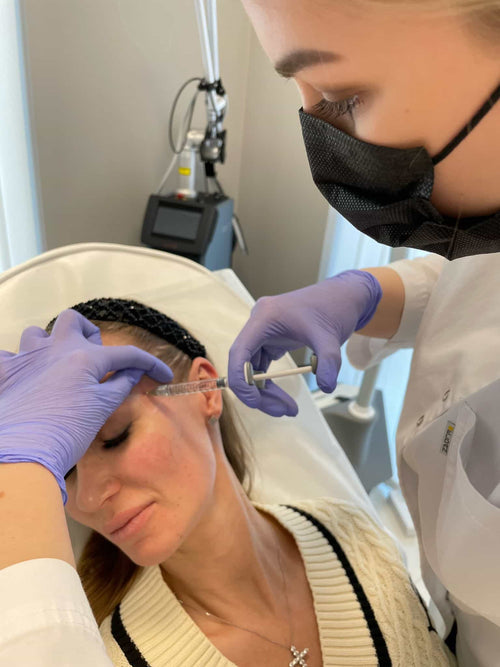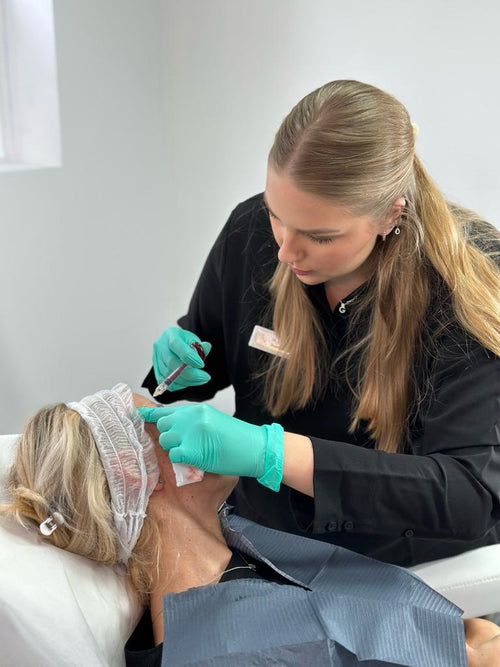Consult with Dr. Laura Geige for Dermal Fillers Now
Immediate Relief
Book a Dermal Filler Session with Dr. Laura Geige Today
Cold Compresses
Book Your Dermal Filler Session with Dr. Laura Geige Now
Immediately after getting lip filler, swelling and some bruising are normal. However, if swelling becomes excessive or doesn’t improve within a few days, it may be necessary to take steps to reduce it.
Cold compresses can be very effective in managing swelling caused by lip filler injections.
Here’s how to use a cold compress for lip swelling:
1. **Wrap** a few ice cubes in a thin towel or cloth.
2. **Apply** the wrapped ice to your lips for 10-15 minutes at a time.
3. **Remove** the cold compress and allow your lips to warm up for a few minutes.
4. **Repeat** this process several times throughout the day, especially in the first 24-48 hours after treatment.
Cold compresses help constrict blood vessels, which can reduce swelling and inflammation.
It’s important to avoid direct contact with the ice on your skin, as this can cause further irritation or frostbite.
Additionally, be sure to keep the compress clean and change it frequently to prevent the spread of bacteria.
Elevating Your Head
Immediate relief from lip swelling after filler often involves a combination of practical measures and lifestyle adjustments.
Here are some tips for reducing swelling:
1.
Apply ice packs.
* Wrap ice in a thin towel or cloth to protect your skin from direct contact with the cold. Apply the ice pack to your lips for 10-15 minutes at a time, several times throughout the day.
2.
Elevate your head.
* Sleeping with your head elevated can help reduce swelling by promoting drainage of fluids. Use an extra pillow or two to achieve this position.
3.
Stay hydrated.
* Drinking plenty of water can help flush out excess fluid and speed up the healing process.
4.
Avoid strenuous activity.

* Refrain from activities that could increase blood flow to your face, such as exercise or hot yoga.
5.
Do not touch or rub your lips.
* This can irritate the area and potentially delay healing.
Remember that swelling is a normal part of the healing process after filler injections. It typically subsides within a few days to a week. If you experience excessive swelling, pain, or other concerning symptoms, consult your injector or a medical professional immediately.
Over-the-Counter Remedies
Antihistamines
Over-the-counter (OTC) remedies can offer some relief for lip swelling following filler injections.
Antihistamines, such as diphenhydramine (Benadryl), loratadine (Claritin), or cetirizine (Zyrtec), are commonly used to reduce allergic reactions and inflammation. They work by blocking the effects of histamine, a chemical released in the body during an allergic response that contributes to swelling.

Applying a cold compress to the swollen lips can also help minimize inflammation. A bag of frozen peas wrapped in a towel or an ice pack can be applied for 15-20 minutes at a time, several times a day.
OTC pain relievers like ibuprofen (Advil) or naproxen (Aleve) can help reduce pain and discomfort associated with lip swelling. These medications are nonsteroidal anti-inflammatory drugs (NSAIDs) that work by reducing inflammation throughout the body.
It is important to note that these remedies may provide temporary relief but will not address the underlying cause of the swelling, which could be an adverse reaction to the filler material.
If swelling is severe, persists for more than a few days, or is accompanied by other concerning symptoms, it is crucial to seek immediate medical attention.
Pain Relievers
Lip swelling after filler injections is a common side effect and typically resolves on its own within a few days to a week. Over-the-counter remedies can help manage discomfort and reduce inflammation during this time.
Ice Packs: Apply ice packs wrapped in a towel to the affected area for 10-15 minutes at a time, several times a day. This helps constrict blood vessels, reducing swelling and pain.
Arnica Gel or Cream: Arnica is a natural remedy that has anti-inflammatory properties. Apply arnica gel or cream topically to the swollen lips several times a day.
Hydrocortisone Cream: A low-dose hydrocortisone cream (1%) can be applied topically to reduce inflammation and itching. Follow the product instructions carefully.
**Pain Relievers:**
Ibuprofen or naproxen are nonsteroidal anti-inflammatory drugs (NSAIDs) that can effectively reduce pain and swelling. Take them according to the recommended dosage on the label. Acetaminophen (Tylenol) can also help manage pain but does not have anti-inflammatory effects.
Oral Antihistamines: In some cases, an over-the-counter oral antihistamine like diphenhydramine (Benadryl) may help reduce swelling if it is caused by an allergic reaction. However, it’s important to consult with a healthcare professional first.
**Important Considerations:**
• Always follow the product instructions carefully and do not exceed recommended dosages.
• If you experience severe or persistent swelling, redness, pain, or other concerning symptoms, seek immediate medical attention.
When to See a Doctor
Signs of Infection
Determining when to seek medical attention for lip swelling after filler injections is crucial for ensuring proper healing and minimizing complications.
While some mild swelling is normal in the days following treatment, it’s essential to be aware of potential signs of infection or other adverse reactions.
Consult a doctor immediately if you experience any of the following:
-
Severe or persistent swelling that doesn’t improve after 72 hours.
-
Swelling that spreads beyond your lips to your face, neck, or jawline.
-
Increasing pain, redness, tenderness, or warmth around the injection site.
-
Pus or discharge from the injected area.
-
Fever, chills, or other signs of systemic infection.
-
Difficulty breathing or swallowing.
These symptoms could indicate an infection requiring prompt medical treatment with antibiotics.
Here are some common signs of infection:
-
Redness and warmth around the injection site.
-
Tenderness or pain that worsens over time.
-
Swelling that is firm and doesn’t feel soft.
-
Pus or discharge from the injection site.
-
Fever, chills, or other signs of illness.
Early recognition and treatment of infection are crucial for preventing complications.
It’s always better to err on the side of caution and seek medical advice if you have any concerns about your lip swelling after filler injections.
Excessive Swelling or Discomfort
Excessive swelling or discomfort after filler injections can be concerning. While some degree of swelling is normal, certain situations warrant a visit to a medical professional.
It’s important to contact your doctor immediately if you experience any of the following:
-
Severe or worsening swelling that doesn’t improve within a few days
-
Swelling that spreads beyond the injection site
-
Pain, tenderness, or redness that intensifies over time
-
Signs of infection, such as fever, pus, or warmth at the injection site
-
Difficulty breathing or swallowing
-
Blurred vision or double vision
-
Numbness or tingling in your lips, face, or neck
These symptoms could indicate a serious complication requiring prompt medical attention.
While waiting for your doctor’s appointment, you can try applying a cold compress to the area to reduce swelling. Avoid touching or massaging the injection site, and refrain from using makeup or skincare products in the affected area until you see your doctor.
Alkhemist LA Mind Plus Motion Elizabeth Joy Photo
- Downturned Smile Treatment Near Peper Harow, Surrey - May 8, 2025
- Dermal Fillers Near Merrow, Surrey - May 8, 2025
- New Patient Treatment Near Merton, Surrey - May 7, 2025
